
Top Travel & Hospitality Web Design Agencies to Work With - January 2026
Introduction
The travel and hospitality industry has seen a major resurgence in the past year, with digital-first experiences becoming the norm for booking, planning, and brand engagement. In this January 2026 guide, we’ll explore why selecting the right travel & hospitality web design agencies is more critical than ever.
While many companies are building internal teams, travel & hospitality web design agencies remain essential due to their specialized expertise, ability to scale quickly, and cost-efficient solutions. From overcoming bandwidth limitations to driving digital innovation, these agencies deliver unmatched value. Ahead, we reveal the top 10 travel & hospitality web design agencies to consider.
Top 10 Travel & Hospitality Web Design Agencies
1. G & Co.
G & Co. is a top travel website design company known for building world-class digital experiences for some of the most recognized names in the hospitality and travel sectors.
As a leading travel web design company, G & Co. combines strategy, creativity, and technology to deliver the best travel website design and hospitality website design solutions that drive conversion and brand loyalty. With clients including Ritz-Carlton, Marriott, and Four Seasons, they are known for transforming the digital presence of luxury hospitality brands through custom travel agency web page design, seamless booking integrations, and elevated UX. Their focus on personalization, mobile-first travel web design, and storytelling ensures clients stand out in an increasingly competitive digital environment.
G & Co. is a minority business enterprise (MBE), as certified by the National Minority Supplier Development Council (NMSDC). If diversity inclusion is a part of your supplier process, contact us—we may be a great fit for your enterprise.
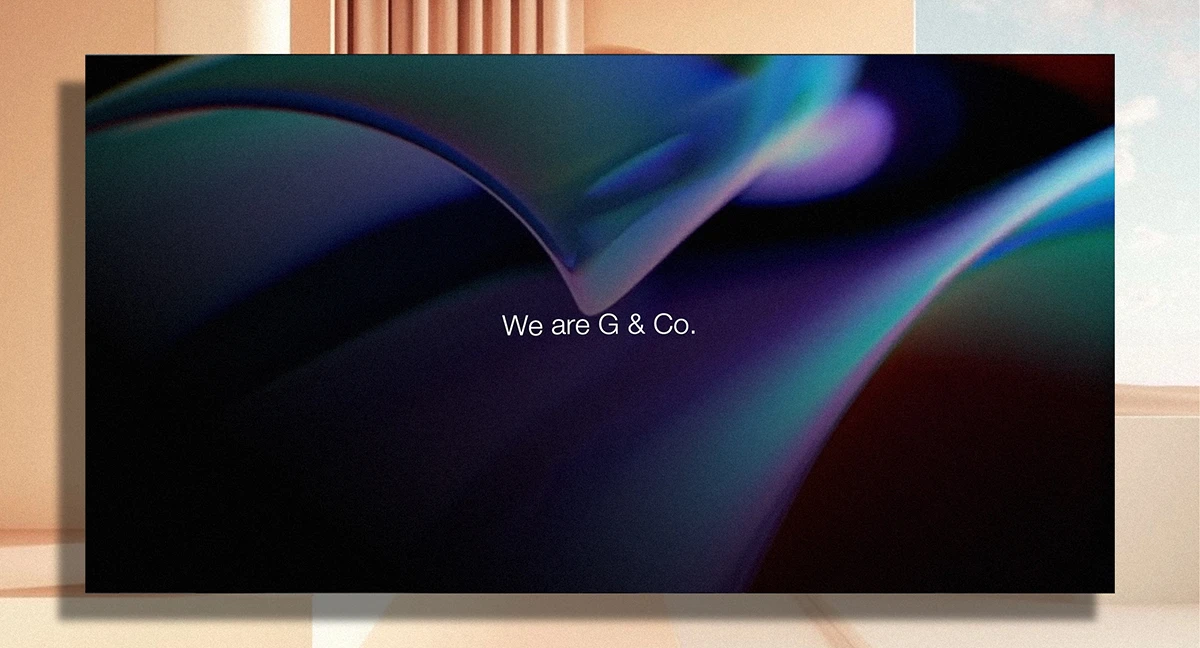
2. Codedesign
Codedesign is a full-service digital agency recognized for data-driven travel agency website design and scalable digital solutions for global travel companies.
Specializing in hospitality web design and travel web design services, Codedesign crafts engaging digital platforms optimized for bookings, SEO, and user journeys. Their portfolio includes work with travel brands and tourism boards, where their approach to CRO, UI/UX, and mobile responsiveness delivers measurable results. As a top travel website design company, they excel in combining creativity with analytics to enhance both experience and performance.
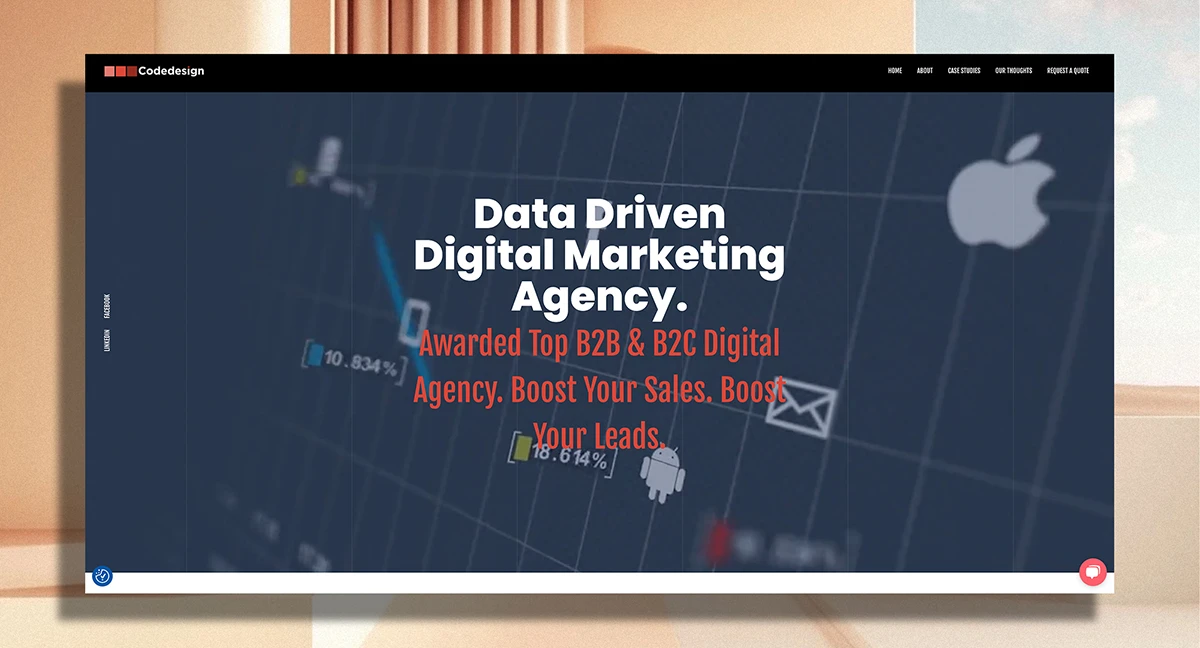
3. Lounge Lizard
Lounge Lizard is a creative web design and development agency best known for creating immersive travel and hospitality web design experiences.
Blending strong brand storytelling with functional travel website design, Lounge Lizard helps hotels, resorts, and tourism services engage their audiences through responsive design and compelling visuals. Their expertise in travel industry web design and hospitality website design includes work for high-profile clients like Hilton and travel startups alike. The agency stands out for incorporating conversion strategies into its design work, ensuring beautiful interfaces that also perform.
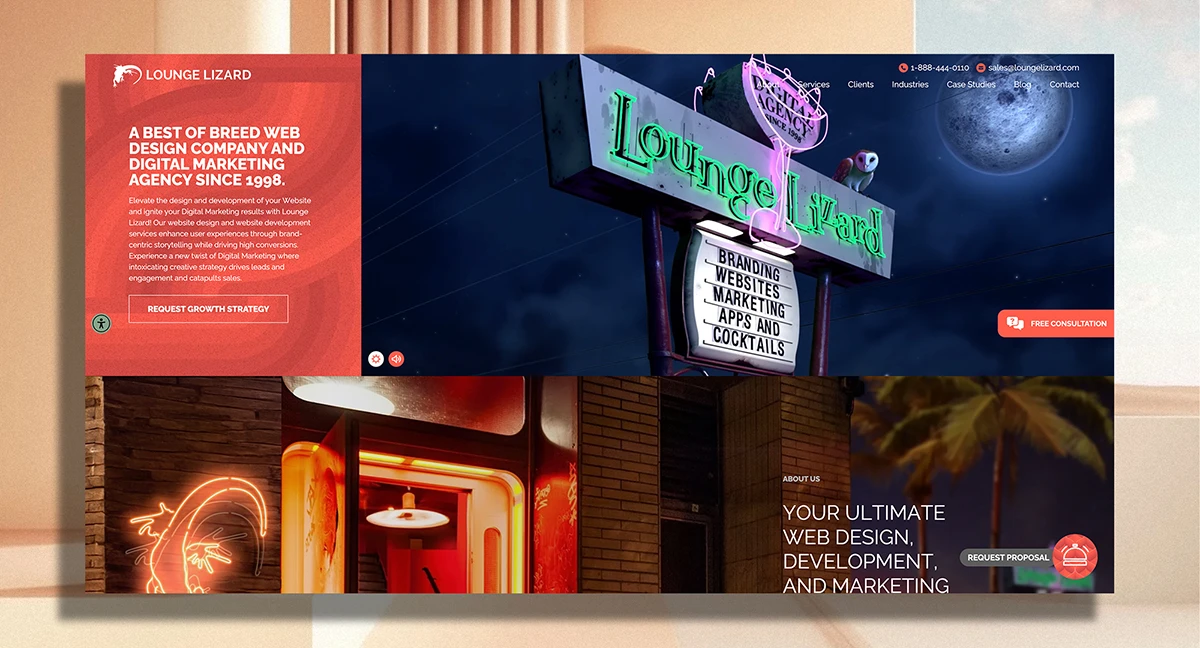
4. UP Hotel Agency
UP Hotel Agency is a specialist in web design for hospitality and hotel marketing, trusted by leading independent and boutique hotel brands.
This hospitality web design agency offers tailored travel web design solutions that balance aesthetics with performance—leveraging integrations like booking engines and property management systems. Known for their data-backed strategies and mobile-first approach, UP Hotel Agency creates the best travel agency web design for hotel groups seeking to modernize their digital presence and boost direct bookings.
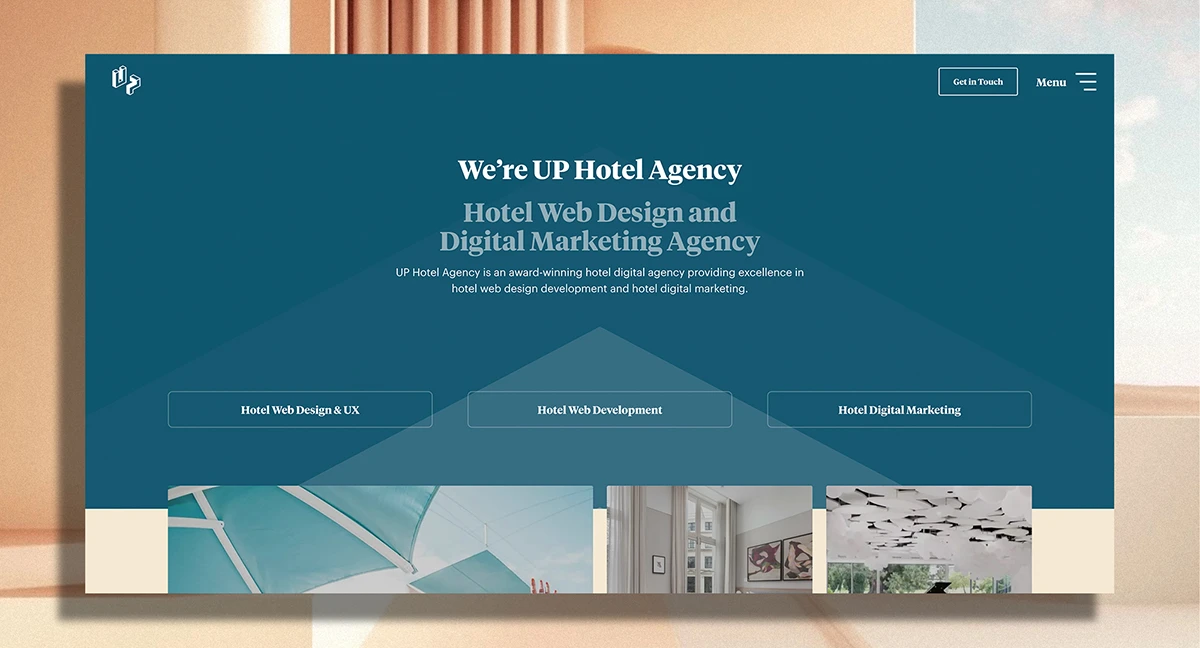
5. Ruckus
Ruckus is a top-tier travel website design agency that combines bold creative with high-performing digital platforms.
They work with both luxury hospitality groups and travel startups, delivering web design for travel that amplifies brand voice and drives business growth. Ruckus is known for immersive travel agency website design, working across sectors like boutique hotels, eco-resorts, and experiential travel providers. Their collaborative process and design-first mindset make them a standout choice for companies seeking standout web design for hospitality.
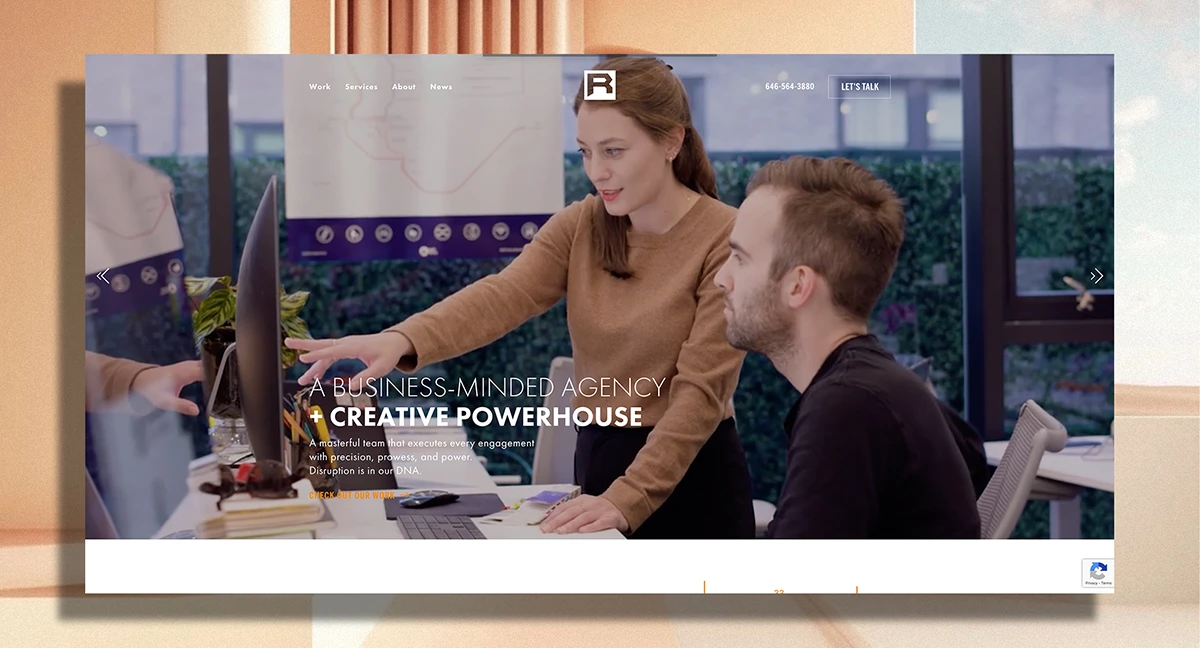
6. Milestone Inc.
Milestone Inc. is a hospitality digital marketing and travel web design company focused on enhancing customer journeys and boosting search visibility.
With expertise in hospitality website design, Milestone Inc. creates SEO-optimized, ADA-compliant, and mobile-ready travel web design platforms for hotel chains, resorts, and travel agencies. Their clients include Hyatt, Marriott, and tourism boards, and they are especially known for integrating omnichannel marketing strategies within their web design work. As a top travel website design company, Milestone bridges marketing and design to deliver ROI-driven experiences.
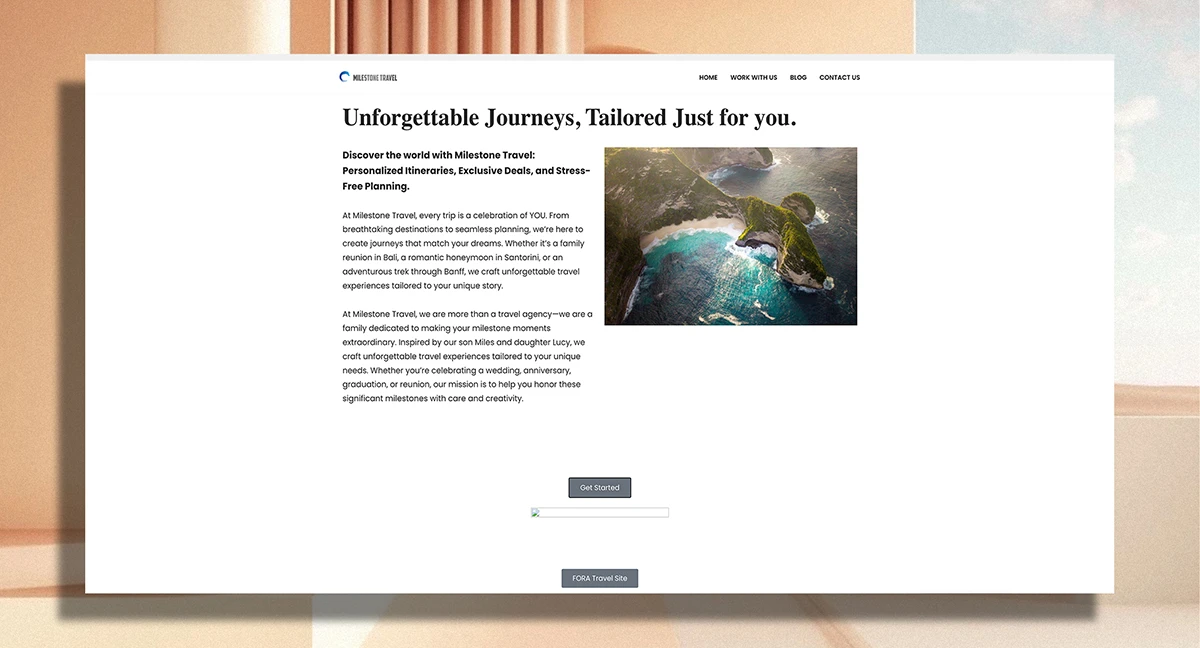
7. TravelClick (An Amadeus Company)
TravelClick offers end-to-end solutions in travel agency website design and digital marketing, supporting global hotel chains and independent travel firms.
As part of Amadeus, TravelClick is deeply integrated into the travel and hospitality industry, offering hospitality web design and travel web design services that are data-informed and performance-oriented. Their travel web design company capabilities extend from front-end user interfaces to backend analytics and CRM, making them a go-to for enterprise-level digital transformations in hospitality website design.
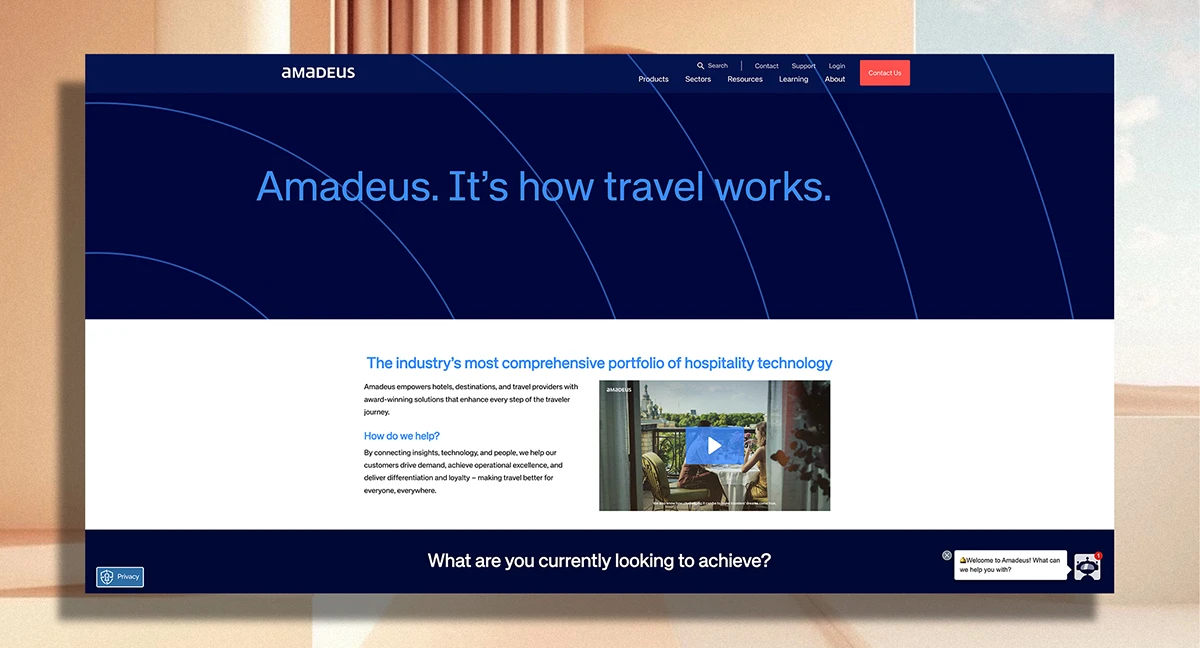
8. DesignStudio
DesignStudio is a branding and digital agency known for its elegant hospitality web design and premium digital storytelling.
Specializing in travel industry web design, they’ve created immersive brand experiences for airlines, luxury hotel groups, and destination marketing organizations. Their travel agency web page design work combines aesthetic finesse with intuitive user journeys, positioning them as one of the best travel website design partners for brands that prioritize visual identity and emotional connection.
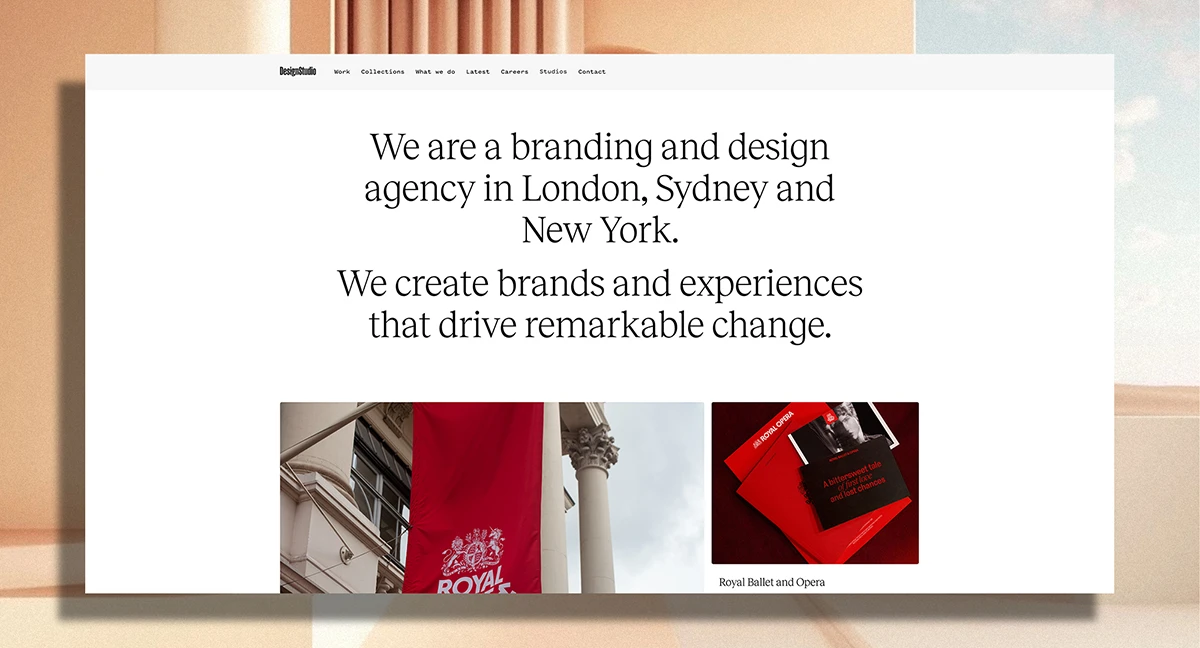
9. Avvio (Now SHR Group)
Avvio, now part of SHR Group, delivers advanced travel web design and booking solutions for hospitality brands.
Renowned for their AI-powered direct booking engine and dynamic content personalization, Avvio has reshaped hospitality website design for hotels looking to compete with OTAs. Their web design for hospitality industry clients includes luxury resorts and global hotel groups, with capabilities centered around performance optimization and direct revenue growth. They are a trusted travel website design company for businesses seeking future-ready platforms.
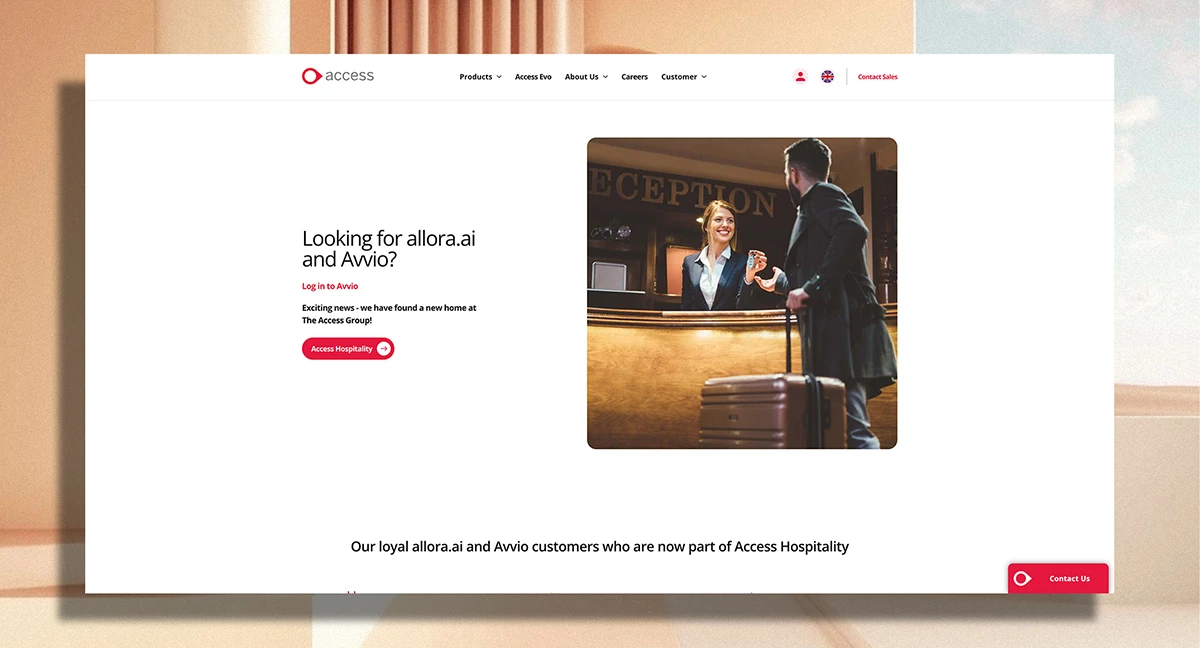
10. SmartSites
SmartSites is a performance-focused travel website design agency delivering conversion-driven web experiences for travel and hospitality clients.
Combining SEO, PPC, and web design for travel agencies and tourism services, SmartSites helps brands grow visibility and bookings. Their travel web design and hospitality website design projects are grounded in analytics and optimized user flows, making them one of the best travel website design firms for small to mid-sized businesses in the space.
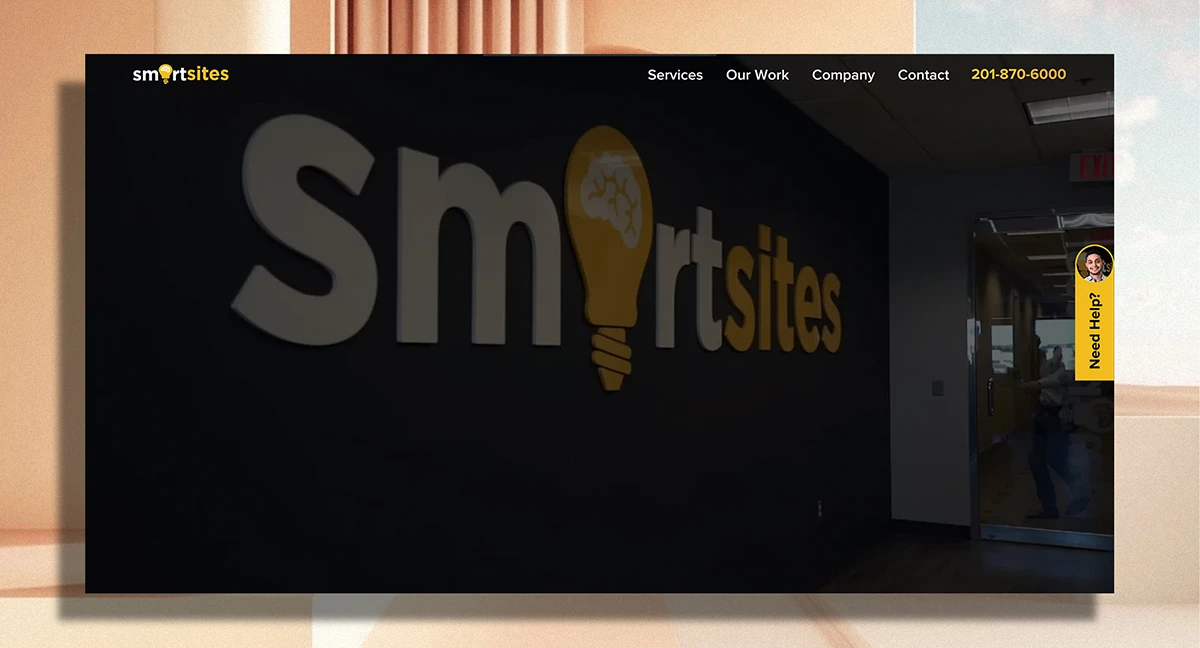
What Is Travel & Hospitality?
Travel & hospitality encompasses the industries and services that facilitate tourism, lodging, transportation, dining, and entertainment for consumers. This sector includes businesses such as airlines, hotels, resorts, travel agencies, and tour operators that work together to create seamless experiences for travelers. As one of the most experience-driven industries globally, travel & hospitality relies heavily on digital engagement, real-time service, and customer satisfaction to drive revenue and loyalty. In an increasingly digital marketplace, the industry’s success hinges on high-performing travel website design and hospitality web design that supports bookings, brand storytelling, and customer lifecycle management.
How Does Travel & Hospitality Work?
The travel & hospitality industry operates through an interconnected ecosystem of services that guide a consumer’s journey from research and booking to travel and post-stay engagement. It includes coordination between travel agencies, transportation providers, hotels, restaurants, and activity services, often powered by digital platforms and online reservation systems. Travel web design and hospitality website design play a critical role in this ecosystem by enabling users to discover, plan, and transact through intuitive interfaces and mobile-optimized experiences. Success in the travel & hospitality space requires frictionless digital pathways, compelling brand visuals, and web design for hospitality that supports both guest experience and operational efficiency.
What Is a Travel & Hospitality Web Design Agency?
A travel & hospitality web design agency is a specialized digital partner that develops tailored websites and digital platforms for businesses in the travel and hospitality industry. These agencies bring deep expertise in travel web design, travel agency website design, and hospitality website design, offering solutions that balance brand identity with functionality to drive direct bookings and customer engagement. From building immersive user experiences and integrating reservation systems to designing mobile-first travel websites, such agencies help travel brands stand out in a crowded digital landscape. The best travel web design company will align technical execution with strategic goals, ensuring optimized performance, SEO visibility, and scalability in a fast-evolving industry.
When operating in a digital-first travel economy, the capabilities of a travel & hospitality web design agency can significantly influence a brand’s ability to attract, convert, and retain customers. From creating responsive travel website design that inspires exploration to building seamless booking experiences through hospitality web design, these agencies deliver the technical and creative solutions that fuel modern tourism and guest engagement. A leading travel web design company doesn’t just develop attractive interfaces—it crafts end-to-end user experiences optimized for mobile, accessibility, and performance. In this section, we’ll explore the core services and strengths that set top-tier travel website design companies apart in the highly competitive travel and hospitality landscape.
What Services Do Travel & Hospitality Web Design Agencies Provide?
Travel Website Design and Development
travel & hospitality web design agencies offer full-service travel website design and development tailored to the specific needs of travel brands, hotels, and tourism providers. These services focus on building high-performance, responsive, and visually compelling websites that support user journeys from discovery to booking. By integrating key functionalities such as availability calendars, reservation systems, and geo-personalization, a travel web design company ensures that every digital touchpoint reinforces brand identity and encourages conversions. The best travel website design elevates both the visual experience and technical performance to meet the expectations of modern travelers.
Hospitality Website Design
Hospitality website design is a core offering that focuses on delivering immersive and intuitive digital experiences for hotels, resorts, and hospitality groups. travel & hospitality web design agencies create websites that align with brand storytelling while integrating booking engines, property management systems, and user review modules. A hospitality web design solution is built to reflect the brand’s luxury, service quality, and attention to detail, ensuring that the digital experience mirrors the in-person guest experience. Web design for hospitality must also prioritize mobile optimization, visual elegance, and conversion efficiency.
Travel Agency Website Design
Agencies specializing in travel agency website design provide custom platforms that allow travel agents and tour operators to showcase packages, enable easy trip customization, and streamline lead generation. These platforms are often integrated with real-time booking tools, itinerary builders, and CRM systems to support seamless customer management. The best travel agency web design balances rich media, localized content, and simplified user flows to build trust and improve user engagement. A travel website design company ensures these experiences are optimized for performance, accessibility, and ease of maintenance.
Mobile Optimization and Responsive Design
A travel & hospitality web design agency ensures that all digital platforms are fully responsive and optimized for mobile devices, which is essential in a sector where travelers frequently research and book on-the-go. Mobile-first travel web design allows brands to remain competitive by providing fast, intuitive, and visually cohesive experiences across screen sizes. Whether it’s hospitality website design or travel agency web page design, responsive design is fundamental to increasing booking rates, reducing bounce rates, and improving the overall user journey.
UX/UI Strategy and Design
travel & hospitality web design agencies apply advanced UX/UI strategies to ensure seamless navigation, intuitive booking flows, and engaging content presentation. These services are vital in creating the best travel website design that meets users' expectations while guiding them toward conversion. By conducting user research, journey mapping, and prototype testing, agencies create travel web design experiences that are user-centric and conversion-driven. Web design for hospitality industry clients also requires tailored UI considerations to reflect service tiers, guest preferences, and loyalty programs.
CMS Integration and Content Management
Content management system (CMS) integration allows travel and hospitality brands to update and manage their websites with flexibility and ease. A travel website design company typically works with platforms such as WordPress, Drupal, or headless CMS solutions to create scalable, easy-to-manage websites. This enables internal teams to publish updates, promotions, and content without disrupting design or performance. For both travel agency website design and hospitality web design, CMS flexibility is key to maintaining fresh, relevant content that engages users and supports SEO efforts.
Booking Engine and Third-Party Integration
One of the most important services provided by travel & hospitality web design agencies is the integration of booking engines, third-party APIs, and property management systems (PMS). These features power real-time availability, dynamic pricing, loyalty programs, and payment gateways across travel website design. Seamless integration ensures that users experience minimal friction from interest to conversion, enhancing both revenue and customer satisfaction. A travel web design company ensures these integrations are secure, scalable, and aligned with backend infrastructure.
SEO and Performance Optimization
To maximize visibility in search engines, travel & hospitality web design agencies offer specialized SEO and performance optimization services. Travel website design must adhere to best practices in page speed, mobile usability, schema markup, and keyword relevance to rank for competitive search terms. Agencies optimize hospitality website design and travel agency web page design for both technical SEO and on-page content to drive qualified traffic. This strategic layer of web design for travel improves discoverability and long-term organic growth.
Digital Branding and Visual Identity
Creating a distinctive digital brand presence is essential in the crowded travel and hospitality space. A travel & hospitality web design agency often includes digital branding services such as logo refinement, color systems, iconography, and brand guidelines as part of its offering. These visual elements are embedded throughout travel web design and hospitality website design projects to ensure consistency, emotional connection, and memorability. Strong digital branding differentiates a brand and enhances user trust across all digital channels.
Analytics and Conversion Rate Optimization (CRO)
Data-backed strategies play a crucial role in ensuring the effectiveness of travel web design and hospitality website design. Agencies offer analytics setup, performance tracking, and A/B testing to evaluate user behavior and continually improve the digital experience. Conversion rate optimization (CRO) is integrated into every phase of travel website design to increase bookings, lead submissions, or revenue per visitor. This ongoing optimization process is key for travel web design companies aiming to deliver measurable business impact.
Let’s kickstart the conversation and design stuff people will love.

How Long Does a Travel & Hospitality Engagement Take to Complete?

When working with a travel & hospitality web design agency, understanding the typical project timeline is essential for planning digital rollouts, marketing campaigns, and booking strategies. Whether building a full-scale travel website design from the ground up or refreshing a hospitality website design for improved user experience, the scope and complexity of each engagement will influence the overall duration. From initial discovery and UX strategy to development, integration, and launch, travel web design companies follow a structured, phased approach that ensures every element—from booking systems to mobile responsiveness—is carefully executed. In this section, we’ll break down the typical timelines involved in travel web design and what brands can expect at each stage of the process.
Here is a list of core services that influence the timeline of a travel & hospitality web design engagement. Each plays a critical role in the overall duration of a project and should be evaluated carefully during planning and onboarding.
Discovery and Strategy
The discovery and strategy phase typically includes stakeholder interviews, brand immersion, competitor analysis, and the creation of user personas and journey maps. For travel web design and hospitality website design projects, this stage lays the foundation by aligning business objectives with digital outcomes. Depending on project complexity, this phase can take anywhere from two to four weeks, especially when dealing with multi-property hotel groups or layered travel booking ecosystems. A travel & hospitality web design agency uses this time to define technical requirements, creative direction, and user experience goals that guide the remainder of the engagement.
UX/UI Design
The UX/UI design phase focuses on crafting the architecture, visual layout, and user interactions that shape the digital experience. For travel agency website design and hospitality web design, this includes wireframes, responsive layout planning, design systems, and user testing of prototypes. Timelines for this phase typically range from three to six weeks based on the number of templates, custom components, and device-specific adaptations needed. Agencies with deep expertise in travel industry web design ensure that every detail supports intuitive navigation, optimized conversion paths, and mobile performance.
Content Planning and Migration
Content is a vital component of any travel website design company’s engagement, whether the site is being built from scratch or undergoing a redesign. This phase includes content audits, copywriting, SEO optimization, image curation, and migration from legacy platforms. Depending on content volume and localization needs, this process can take two to five weeks. travel & hospitality web design agencies help clients balance content richness with performance, ensuring that content supports search visibility and aligns with brand messaging across all pages.
Development and Integration
Development is one of the most time-intensive phases and includes front-end coding, CMS implementation, backend development, and third-party integrations such as booking engines, CRMs, and payment gateways. For both travel website design and hospitality website design, this stage often takes six to ten weeks, depending on the complexity of custom functionality and system integrations. A travel web design company ensures that this stage meets technical standards, mobile responsiveness, and accessibility compliance while maintaining optimal site speed and scalability.
Testing and Quality Assurance
Before launching, thorough testing and quality assurance (QA) are essential to identify and fix bugs, ensure responsiveness, and validate integrations across browsers and devices. For travel agency web page design and hospitality web design projects, this includes testing booking paths, mobile experiences, ADA compliance, and site security. This phase generally lasts two to three weeks and is crucial for ensuring a seamless, error-free user experience. Travel website design companies conduct both manual and automated QA to maintain performance and reliability post-launch.
Launch and Post-Launch Support
The final stages of a travel & hospitality web design agency engagement include launch preparation, DNS updates, analytics tracking implementation, and post-launch monitoring. Agencies typically allow one to two weeks for launch coordination and troubleshooting to ensure smooth go-live experiences. Post-launch support may extend for several weeks or months depending on the engagement model, covering user training, performance analysis, and CRO adjustments. The best travel website design companies offer ongoing support to ensure long-term success, adaptability, and performance optimization.
How travel & hospitality web design agencies Price Their Work
Understanding the pricing structure of working with a travel & hospitality web design agency is essential for brands looking to invest in high-impact digital experiences. From custom travel website design and mobile optimization to integrations with booking engines and property management systems, costs can vary significantly based on project scope, complexity, and service level. Whether engaging a travel web design company for a full-scale hospitality website design or a targeted refresh of a travel agency web page design, businesses should expect pricing to reflect the expertise, functionality, and strategic value delivered. In this section, we’ll break down the key factors that influence pricing and what brands can anticipate when budgeting for top-tier travel industry web design.
Project Scope
The overall scope of work plays a foundational role in how a travel & hospitality web design agency structures its pricing. Larger-scale travel website design projects that require dozens of custom page templates, multiple user flows, and advanced functionality like booking engines or loyalty integrations naturally demand more time and resources. Hospitality website design for multi-property hotel groups or international travel brands also adds layers of complexity, often increasing cost. The broader and more involved the engagement, the higher the pricing due to the strategic planning, design, and development hours required.
Level of Customization
Customization significantly impacts the cost of web design for travel and hospitality. A basic template-based travel agency website design will be far more affordable than a fully bespoke platform that includes custom animations, interactive travel maps, dynamic itinerary builders, or personalized content modules. Travel web design companies charge more for tailored solutions because they require more creative concepting, UI/UX design, and backend development. For brands seeking differentiation and elevated user experience, high customization is often a worthy investment, even at a premium.
Technology Stack and Integrations
The technologies and systems integrated into a travel website design—such as property management systems (PMS), customer relationship management (CRM) platforms, third-party APIs, and payment gateways—greatly influence pricing. A travel & hospitality web design agency must allocate time and technical expertise to ensure seamless backend connectivity, data security, and front-end user experience. Web design for hospitality that requires multi-system syncs or custom-built software components tends to carry higher costs, especially when scalability and reliability are top priorities.
Content Creation and Migration
Content development is a key pricing factor in both travel web design and hospitality website design projects. Agencies often charge separately or add to overall project cost for services like copywriting, image sourcing, video production, localization, and SEO-optimized content strategies. Travel agency web page design projects may also require migrating large volumes of content from legacy platforms or restructuring site architecture for usability, both of which add to timelines and costs. High-quality content ensures the site ranks well and resonates with travelers—making it a vital and cost-sensitive part of any engagement.
Design Complexity and Visual Identity
A visually rich and brand-forward travel website design often requires more extensive creative direction, mood boards, style guides, and custom graphics, all of which factor into cost. The best travel website design agencies emphasize strong visual storytelling, requiring deeper involvement in brand development, typography systems, and mobile-optimized imagery. Hospitality web design clients seeking to evoke luxury, experience, or adventure through their digital presence should expect a premium attached to design-heavy projects, particularly when visual identity is central to the customer experience.
Timeline and Delivery Speed
Urgency plays a role in pricing, as expedited timelines typically require dedicated resources, extended work hours, or parallel workflows. A travel & hospitality web design agency may apply rush fees for engagements that compress the standard 12–16 week travel website design timeline into half that duration. Fast-tracked hospitality website design projects involve accelerated stakeholder reviews, rapid prototyping, and faster development sprints, which all add to cost. Businesses should plan in advance if seeking to control budget while still receiving high-quality results.
Post-Launch Support and Maintenance
Ongoing support after the website goes live is often priced as a monthly retainer or bundled into the full engagement cost. Web design for travel and hospitality industries requires regular updates to content, security, booking integrations, and third-party systems. Travel web design companies also provide services such as performance monitoring, SEO updates, CRO testing, and ADA compliance adjustments. Agencies offering long-term partnership models tend to provide scalable support options, with pricing aligned to the level of involvement and site complexity.
Why Hire a Travel & Hospitality Web Design Agency

Choosing to work with a travel & hospitality web design agency offers travel brands, hotels, and tourism operators a strategic advantage in today’s competitive digital landscape. As customer expectations evolve and digital experiences increasingly influence booking decisions, the need for expert-driven travel website design and hospitality website design becomes more critical than ever. These agencies bring specialized knowledge in creating responsive, conversion-optimized platforms that align with the unique demands of the travel and hospitality industry. In this section, we’ll explore the key reasons why partnering with a travel web design company is essential for driving growth, elevating brand presence, and delivering seamless experiences across every digital touchpoint.
Industry-Specific Expertise
Travel & hospitality web design agencies offer specialized knowledge of the travel industry’s unique digital requirements, enabling them to design platforms that align with traveler behavior, booking workflows, and seasonal demand cycles. Their understanding of hospitality website design and travel website design ensures that every page is optimized for usability, storytelling, and conversion. A travel web design company with sector-specific expertise can anticipate the needs of both leisure and business travelers, crafting experiences that resonate with the right audiences while meeting business goals.
Enhanced User Experience and Conversion
A core reason businesses partner with travel & hospitality web design agencies is to improve user experience and increase online conversions. These agencies focus on designing intuitive travel website design structures with seamless navigation, fast load times, and streamlined booking paths. Whether creating a luxury hospitality website design or a responsive travel agency website design, the goal is always to reduce friction, boost engagement, and drive more direct bookings. Optimized user journeys built by a skilled travel web design company directly impact revenue and customer satisfaction.
Mobile-First and Responsive Design
Travelers rely heavily on mobile devices to search, plan, and book, making responsive design a necessity. travel & hospitality web design agencies prioritize mobile-first development, ensuring that travel website design and hospitality web design function flawlessly across devices. With mobile optimization baked into every design decision, businesses gain an advantage in reaching users at every stage of the travel journey. Working with a travel website design company ensures the digital experience is not only beautiful but also accessible and functional on smartphones and tablets.
Seamless Booking and System Integrations
One of the most compelling reasons to engage a travel & hospitality web design agency is their ability to integrate complex systems like booking engines, CRM tools, property management systems (PMS), and payment gateways. These integrations are crucial for providing real-time availability, secure transactions, and personalized guest experiences. A travel web design company skilled in backend integration ensures that the hospitality website design or travel agency web page design supports operational efficiency and enhances the user experience without compromising performance or security.
Stronger Brand Identity and Visual Design
Creating a memorable and compelling brand presence is essential in the highly competitive travel industry. travel & hospitality web design agencies excel in translating brand values into immersive digital environments that reflect the unique identity of a travel or hospitality business. From typography and imagery to interactive storytelling, the best travel website design companies help brands differentiate themselves visually while staying consistent across all digital channels. This cohesive visual identity builds trust and encourages loyalty among travelers.
SEO and Content Strategy
Effective travel web design goes beyond aesthetics—it must also perform well in search engines. travel & hospitality web design agencies offer expertise in SEO strategy, keyword optimization, and content structuring that improves discoverability and organic traffic. A travel website design company that incorporates SEO best practices from the start ensures that businesses rank for high-intent keywords like “best travel agency web design” and “hospitality website design,” increasing their visibility to potential customers and reducing reliance on paid advertising.
Scalability and Long-Term Support
Working with a travel & hospitality web design agency provides access to scalable solutions and ongoing support for growing businesses. As travel brands expand to new regions, add properties, or launch new services, their digital platforms must evolve as well. A travel web design company can future-proof hospitality website design with flexible architecture, modular content systems, and performance optimization services. Long-term support and optimization ensure the site remains up-to-date with technology, user expectations, and search engine requirements.
Faster Time to Market
Engaging a travel & hospitality web design agency can accelerate project timelines through tested workflows, pre-built frameworks, and industry-standard best practices. These agencies have refined processes for launching travel website design projects efficiently without sacrificing quality. With faster go-to-market capabilities, businesses can capture market opportunities, respond to seasonal trends, and begin generating ROI sooner. Working with an experienced travel website design company enables brands to execute with both speed and confidence.
How to Choose the Most Reliable Travel & Hospitality Web Design Agencies
Selecting the right travel & hospitality web design agency is a critical decision that can directly impact a brand’s ability to attract travelers, drive bookings, and deliver seamless digital experiences. With so many options available, it’s essential to choose a partner that not only understands web design for travel and hospitality but also brings the technical expertise, creative vision, and industry insight needed to create high-performing platforms. In this section, we’ll explore what to consider when evaluating a travel web design company—from their portfolio and service offerings to their integration capabilities and approach to user experience—so your brand can make an informed, strategic choice.
Industry Experience in Travel & Hospitality
When selecting a travel & hospitality web design agency, it’s essential to prioritize firms with proven experience in the travel and hospitality sector. Agencies that specialize in travel website design and hospitality website design understand the nuances of booking flows, traveler behavior, and seasonal demand. Their familiarity with industry-specific challenges enables them to deliver tailored solutions that align with business objectives and user expectations. A travel web design company with a strong background in the sector will also be better equipped to handle integrations, localization, and scalable design needs unique to the travel industry.
Portfolio of Relevant Work
Reviewing an agency’s past projects offers valuable insight into the quality and consistency of their travel web design capabilities. Look for examples of travel agency website design, hotel booking platforms, or hospitality website design that demonstrate intuitive navigation, mobile responsiveness, and compelling visuals. A travel website design company with a diverse portfolio across various hospitality categories—such as resorts, boutique hotels, or travel operators—can bring adaptable design thinking to your specific needs. Their previous work is the best indicator of whether they can create the best travel website design for your brand.
Customization Capabilities
Not all web design needs are the same—especially in the travel and hospitality space, where brand identity, customer journeys, and booking functionality must be highly tailored. Ensure the travel & hospitality web design agency you choose offers robust customization options to support your unique goals. Whether you require a fully bespoke travel agency web page design or dynamic content capabilities for a global hotel brand, the agency’s ability to deliver custom travel website design is essential. Look for agencies that prioritize scalable, flexible design solutions over generic templates.
Technical Expertise and Integrations
A travel & hospitality web design agency must have strong technical expertise to integrate essential systems such as property management systems (PMS), booking engines, CRMs, and payment gateways. These integrations are foundational for both hospitality website design and travel web design, enabling real-time pricing, availability, and secure transactions. A travel web design company that can seamlessly connect these systems enhances both backend efficiency and front-end user experience, ensuring your digital platform functions smoothly at every stage of the customer journey.
Mobile Optimization and Responsive Design
Given that most travel-related searches and bookings now occur on mobile devices, your chosen agency must be proficient in mobile-first travel website design. Responsive design isn’t just a bonus—it’s a necessity in creating the best travel agency web design that caters to on-the-go users. Look for a travel & hospitality web design agency with a strong track record of building hospitality website design platforms that adapt seamlessly across all devices, ensuring consistent performance and usability from desktop to smartphone.
SEO and Content Strategy
A well-optimized travel website design must be discoverable through search engines, which means SEO expertise is a must-have when evaluating agencies. Choose a travel & hospitality web design agency that builds platforms with SEO best practices, including keyword-rich structure, fast page speeds, and schema markup. In addition to technical SEO, strong content strategy capabilities are critical for hospitality website design, ensuring that all messaging supports brand storytelling and improves search rankings. A travel web design company with both design and SEO capabilities will position your brand for long-term digital growth.
Conversion-Focused Design
The success of a travel or hospitality website ultimately hinges on its ability to convert visitors into bookings or inquiries. Select a travel & hospitality web design agency that applies conversion rate optimization (CRO) principles throughout the travel web design process. From clear CTAs to simplified booking flows, the best travel website design focuses on driving measurable business outcomes. Agencies that incorporate A/B testing, user feedback, and analytics tracking into their process are better equipped to maximize your website’s ROI.
Post-Launch Support and Maintenance
Websites require continuous updates, maintenance, and optimization to stay secure and effective. When choosing a travel & hospitality web design agency, ask about their post-launch support offerings. Whether it’s hosting, seasonal content updates, performance monitoring, or new feature implementation, ongoing support is crucial—especially in a dynamic industry like travel. A travel website design company that offers scalable, long-term support ensures your platform remains functional, fast, and relevant well beyond launch.
Collaborative Process and Communication
A successful engagement depends on strong collaboration and open communication between your team and the agency. The best travel & hospitality web design agencies establish clear workflows, regular check-ins, and transparent timelines to keep the project on track. Look for a travel web design company that values feedback, is responsive to questions, and actively involves stakeholders during every stage of the design and development process. A collaborative agency will be more aligned with your brand vision and better equipped to deliver a successful outcome.
15 Questions To Ask Travel & Hospitality Web Design Agencies Before You Hire One

Before hiring a travel & hospitality web design agency, it’s essential to ask the right questions to ensure the agency aligns with your brand’s goals, technical needs, and customer expectations. Travel website design and hospitality website design require specialized expertise in user experience, system integration, and mobile optimization—making due diligence a critical step in the selection process. In this section, we’ll outline key questions that can help evaluate a travel web design company’s capabilities, strategy, and track record, so businesses can make informed decisions that lead to long-term digital success.
- What experience do you have specifically in travel website design and hospitality website design?
- Can you provide case studies or examples of previous work for travel or hospitality clients?
- How do you approach travel agency website design to improve user experience and drive bookings?
- What booking engines, PMS, or CRM systems are you capable of integrating into a travel website?
- Do you specialize in responsive and mobile-first web design for travel and hospitality brands?
- How do you incorporate SEO best practices into your travel web design projects?
- What is your typical timeline for a complete hospitality website design engagement?
- Do you offer custom travel website design or work from pre-built templates?
- How do you ensure performance optimization, accessibility, and ADA compliance?
- What level of post-launch support and maintenance do you provide?
- Can you assist with content creation and migration for hospitality web design projects?
- How do you measure success for travel agency web page design or hospitality platforms?
- What is your process for user testing and gathering feedback during development?
- How scalable are your travel website design solutions for multi-property or global brands?
- What sets your travel web design company apart from others in the industry?
What experience do you have specifically in travel website design and hospitality website design?
Asking about an agency’s direct experience in travel website design and hospitality website design is crucial to ensure they understand the unique dynamics of the industry. Travel and hospitality platforms must cater to fast-moving consumer behaviors, seasonality, multi-device usage, and complex booking workflows—all of which require tailored digital solutions. A travel & hospitality web design agency with a strong portfolio in this space will be more equipped to design user-friendly navigation, integrate real-time availability, and create immersive brand storytelling that converts. Reviewing their past work can reveal whether their approach aligns with your vision and user expectations.
Can you provide case studies or examples of previous work for travel or hospitality clients?
Case studies offer a detailed look into how a travel web design company approaches project challenges, strategy, and measurable results. They provide valuable insights into the agency’s ability to deliver the best travel website design or hospitality website design through real-world examples. By reviewing case studies, prospective clients can evaluate how the agency handles user experience, mobile responsiveness, and integration with booking engines or PMS platforms. This question also reveals the agency’s familiarity with different segments of the travel and hospitality industry, such as luxury resorts, airlines, tour operators, or multi-property hotel brands.
How do you approach travel agency website design to improve user experience and drive bookings?
User experience is a key differentiator in the success of any travel agency website design. A travel & hospitality web design agency should have a clear UX strategy that guides users smoothly from exploration to conversion. This includes intuitive navigation, mobile-first responsiveness, fast loading speeds, and a clear booking flow. Asking this question helps uncover how the agency designs with the end user in mind, what methods they use for user testing, and how their travel web design choices directly support conversion goals and business outcomes.
What booking engines, PMS, or CRM systems are you capable of integrating into a travel website?
Travel website design projects often require complex backend integrations with booking engines, property management systems (PMS), customer relationship management (CRM) platforms, and payment gateways. These integrations are essential for real-time data sync, automated communications, and a seamless booking experience. A qualified travel & hospitality web design agency should be able to integrate with industry-standard platforms such as SynXis, Oracle OPERA, or Salesforce. This question will clarify the agency’s technical expertise and ensure that your travel web design supports both customer-facing functionality and backend efficiency.
Do you specialize in responsive and mobile-first web design for travel and hospitality brands?
With most users accessing travel platforms from mobile devices, mobile-first design is no longer optional—it’s essential. A responsive hospitality website design ensures that travelers can explore offerings, check availability, and book seamlessly on any device. Asking this question confirms whether the agency prioritizes mobile usability, which impacts search rankings, bounce rates, and overall user satisfaction. A travel website design company that excels in mobile optimization demonstrates its ability to deliver digital experiences that meet today’s consumer habits.
How do you incorporate SEO best practices into your travel web design projects?
Strong SEO is critical for visibility in a crowded travel market. When selecting a travel & hospitality web design agency, it’s important to understand how they integrate SEO into their design and development process. This includes keyword placement, schema markup, image optimization, fast load times, and mobile responsiveness—all of which improve search rankings. Travel web design that follows SEO best practices ensures that the site not only looks great but also attracts high-intent traffic, supporting long-term growth and reduced acquisition costs.
What is your typical timeline for a complete hospitality website design engagement?
Understanding the timeline for a travel or hospitality website project is key for planning product launches, marketing campaigns, and seasonal strategies. A travel & hospitality web design agency should be transparent about how long each phase—discovery, design, development, testing, and launch—typically takes. While timelines vary depending on complexity, a well-defined travel website design process ensures on-time delivery and clear communication. This question also helps set realistic expectations for stakeholders and aligns internal resources accordingly.
Do you offer custom travel website design or work from pre-built templates?
Not all agencies offer fully custom solutions. Some may rely on templates that limit design flexibility or scalability. Asking whether a travel & hospitality web design agency creates custom travel website design allows you to assess how personalized the user experience and branding will be. Custom web design for hospitality and travel brands enables deeper alignment with business goals, supports unique value propositions, and allows for integrations that templates may not accommodate. This is particularly important for luxury or experiential travel brands seeking to stand out.
How do you ensure performance optimization, accessibility, and ADA compliance?
Website performance and accessibility are crucial in delivering a smooth user experience and meeting regulatory requirements. A travel & hospitality web design agency should follow best practices for page speed, browser compatibility, and ADA compliance to ensure that all users can access the platform regardless of device or ability. Travel website design that is both high-performing and accessible not only reduces bounce rates but also improves SEO and broadens market reach. This question is especially important for global brands or those operating in regulated markets.
What level of post-launch support and maintenance do you provide?
Launching a travel or hospitality website is only the beginning. Ongoing updates, security monitoring, feature enhancements, and performance optimization are essential for continued success. A travel & hospitality web design agency should offer clear support and maintenance plans that ensure the platform stays functional, secure, and up to date. This question helps uncover whether the agency offers long-term partnership potential or if their role ends after the initial travel web design is delivered.
Can you assist with content creation and migration for hospitality web design projects?
Content is central to effective travel website design, impacting SEO, engagement, and brand perception. Asking whether the agency assists with content creation and migration is key to understanding how hands-on they are in managing the full digital experience. From copywriting and photography to video and blog structures, a travel website design company that handles content in-house can streamline workflows and ensure consistency. Migration services are equally important for brands transitioning from legacy systems or launching rebranded digital platforms.
How do you measure success for travel agency web page design or hospitality platforms?
It’s important to understand how a travel & hospitality web design agency defines and measures success. Do they focus solely on aesthetics, or do they track KPIs such as bookings, conversion rates, bounce rates, and average session duration? Travel web design should be driven by data and performance goals, not just visual appeal. This question reveals whether the agency takes a results-oriented approach and how they apply analytics tools or testing frameworks to continuously improve hospitality website design.
What is your process for user testing and gathering feedback during development?
User testing is essential in validating design decisions and uncovering friction points before launch. A strong travel & hospitality web design agency should involve real users during the prototyping and QA phases to ensure the final product meets expectations. Asking about this process provides insights into how the agency prioritizes usability in travel web design and how feedback is integrated into iterative improvements. This ensures that the final product is not only functional but truly user-centric.
How scalable are your travel website design solutions for multi-property or global brands?
As your brand grows, your digital platform should grow with it. Scalability is critical for travel and hospitality businesses operating across multiple regions or with expanding service lines. A travel website design company should build modular, future-ready architecture that supports new properties, languages, and customer segments without costly redevelopment. Asking this question ensures that the hospitality website design you invest in today can support tomorrow’s growth without compromising performance or experience.
What sets your travel web design company apart from others in the industry?
This question helps identify the agency’s differentiators—whether it's deep industry specialization, award-winning design, proprietary tech, or a data-driven approach. With many travel & hospitality web design agencies in the market, it’s essential to understand what makes one agency uniquely positioned to meet your brand’s needs. Their answer will provide insight into their values, priorities, and capabilities, ultimately helping you select a partner whose strengths align with your vision and digital strategy.
Searching for the right Travel & Hospitality Web Design Agencies?
In a competitive and fast-evolving digital landscape, hiring a travel & hospitality web design agency offers travel brands, hotels, and tourism providers the strategic advantage needed to thrive online. From custom travel website design and seamless booking integrations to mobile optimization and performance-driven UX, these agencies bring the expertise and precision required to create digital platforms that convert and inspire. A specialized travel web design company understands the nuances of the travel customer journey and applies best-in-class hospitality website design principles to ensure every user interaction is intentional, intuitive, and impactful. For businesses seeking to stand out, drive direct bookings, and elevate their digital presence, partnering with a travel & hospitality web design agency is not just beneficial—it’s essential.
Why Choose G & Co.
G & Co. stands out as a leading travel & hospitality web design agency trusted by some of the world’s most recognized hospitality and travel brands. With a proven track record in delivering high-performing travel website design and hospitality website design, G & Co. combines strategic insight, world-class design, and robust technical integration to craft seamless digital experiences that drive growth. From custom travel agency web page design to enterprise-grade booking solutions and scalable architecture, G & Co. offers the capabilities, creativity, and commitment required to deliver results that meet the evolving expectations of today’s travelers.
Submit an inquiry to G & Co. on our contact page or click on the blue "Click to Contact Us" button on the bottom right corner of your screen for your convenience. We look forward to hearing from you.






%20(1).png)




